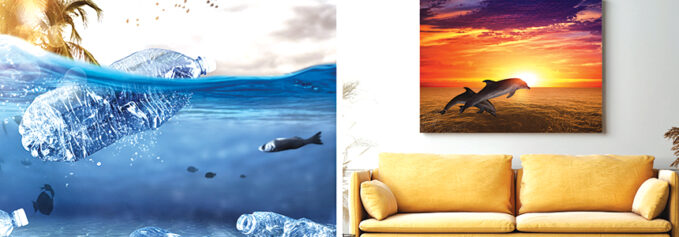
By Cassandra Balentine
Textiles are used for a range of wide format print applications including banners, flags, displays, wallcoverings, and tablecloths. As sustainability continues to be a factor in media selection, recycled, recyclable, and specialty fabrics made with special fibers are gaining popularity among print service providers (PSPs).
Above: HP Large Format Media currently offers recycled fabric products made with recycled water bottles and coating materials.
Recycled and Recyclable Fabrics
Sustainability is the most obvious and popular selling point for printing to recycled and recyclable fabrics.
“The primary advantage of using recycled fabrics for digital wide format printing is their environmental impact. Recycled polyester helps divert plastic bottles from landfills while reducing the demand for virgin polyester production. This process conserves petroleum resources and lowers overall energy consumption,” comments Sharon Roland, director of marketing, Fisher Textiles.
Further, by estimating the number of plastic PET bottles used per linear yard of fabric it is easier to quantify the sustainability impact. “Our Enviro-Tex fabrics contain between 20 to 51 recycled 500 milliliter (ml) water bottles per linear yard,” shares Roland.
Fisher Textiles continues to expand its sustainable product line by incorporating recycled polyester, which helps divert PET bottles from landfills, lowers energy consumption, and conserves the petroleum resources used in producing virgin polyester.
In April 2025, Fisher Textiles released ET9608 Power Stretch, ET9848 EZ Stretch Premium, ET9860 Silver Back, and ET9118 White-Out, which are recycled versions of four of its more popular products. Each eco-friendly alternative is made up of a certain percentage of post-consumer recycled polyester. For example, ET9848 EZ Stretch Premium is the recycled version of GF9048 EZ Stretch. This fabric is made from 100 percent post-consumer recycled polyester and contains about 49 recycled 500 ml bottles per linear yard.
By choosing recycled and recyclable fabrics, Michelle Oczkowski, product manager, Brand Management Group, says businesses can reduce their environmental impact while meeting the demands of a growing market of environmentally conscious customers.
The capabilities afforded by eco-friendly fabric media are extensive. “For example, HP Recycled Removable Adhesive Fabrics are repositionable, stick to any non-porous surface, and can be used for a multitude of print applications, from wall murals and event signage to retail displays, decals, and window graphics,” adds Oczkowski.
Berger Textiles is committed to a more circular business. Its EVO line offers a complete set of more sustainable textiles produced using Global Recycled Standard (GRS)-certified recycled yarn.
GRS is a globally recognized voluntary product standard for tracking and verifying the content and chain of custody of recycled materials in a final product. The GRS includes a 50 percent minimum recycled content percentage and additional social and environmental requirements related to processing and chemical use.
According to Giorgio Volpi, head of marketing, Berger Textiles, there are measurable sustainability benefits for customers that choose these products. “For example, we calculated and analyzed the carbon footprint of our three main best sellers—be.tex Samba, be.tex Lumina, and be.tex Mozaik, and discovered that their EVO counterparts always had a much lower impact to the standard versions.”
Similarly, Dazian LLC offers sustainable fabrics like Evoke, which is derived from fiber produced by repurposed plastic waste. The collection includes wide-width soft and heavy knits, stretch, backlit, mesh, and drapery fabrics. One example is Evoke Trapeze Plus HW, which offers the same technical performance and processing as the original Trapeze Plus HW.
At Aberdeen Fabrics, Inc. sustainability isn’t a buzzword, according to the company’s website, but the very essence of its existence. The company’s proprietary textile manufacturing process, CleanRTex, consumes 90 percent less water than traditional textile processing all while maintaining a zero-waste water system, making it a complete closed-loop solution.
Proving the success of the CleanRTex, an average 100 yard roll of Aberdeen Fabrics Soft Knit consumes 125 gallons or 1,000 pounds of fresh water during production, all of which ends up as waste water. An equivalent roll of CleanRTex Soft Knit uses just 12 gallons or 100 pounds of fresh water.
A standard 20 roll pallet of Aberdeen Fabrics Soft Knit consumes 2,500 gallons or 20,000 pounds of freshwater in production. An equivalent pallet of CleanRTex Soft Knit requires only 240 gallons or 2,000 pounds of fresh water. This results in a 90 percent reduction in water consumed and zero waste water generated, based on research from Aberdeen Fabrics.
Paying the Price
Products made with recycled and recyclable fabrics are often assumed to carry a higher price tag compared to legacy fabrics.
“While recycled and recyclable fabrics often come with a slightly higher price tag, customer feedback on price is evolving,” says Oczkowski.
“A significant and growing segment of consumers are willing to pay a premium for sustainable products. This is especially true for younger generations and those who are highly environmentally conscious. Government agencies also have environmental mandates for products. Some customers are still price sensitive and may hesitate to pay a significant premium, especially in challenging economic times. Yet the willingness to pay a premium for recycled and recyclable fabrics is increasing,” continues Oczkowski.
It is those companies that can effectively communicate the value proposition of sustainable products and demonstrate their commitment to environmental responsibility that are more likely to succeed in this evolving market, points out Oczkowski.
Roland adds that while products made with recycled and recyclable fabrics were once considered more expensive, the cost of recycled fabric media has significantly decreased over the years. It is now competitively priced, making it a more viable option in the market.
Berger Textiles offers many of the products within its EVO range at the same price as its traditionally woven counterparts. “That was the rationale for offering be.tex Aero, be.tex Expandable, and be.tex Revolution exclusively in the EVO configuration. These products deliver the same performance at the same price as their non-recycled equivalents,” shares Volpi.
Most of Media One Digital Imaging, LLC’s customers understand the additional cost associated with recycled fabrics. “The typical 15 to 20 percent per yard price increase allows printers to meet end user requirements while supporting sustainability,” notes the informational hand out on Media One’s digitally printable recycled fabric options.
In the past, additional limitations included the white point of recycled fabric media. However, Roland points out that advancements have greatly improved its quality. “Today, recycled fabrics closely match their virgin counterparts in appearance while maintaining the same premium quality, stretch, and durability while offering a more sustainable choice.”
CiCLO Fibers
Another printable eco-friendly option to enter the wide format media scene utilizes CiCLO.
CiCLO is a sustainable textiles ingredient in the form of an additive that is combined with polyester and nylon during melt extrusion at the very beginning of the fiber-making process, describes Intrinsic Advanced Materials (IAM)—the company behind CiCLO technology.
IAM is a joint venture formed in 2018 between Intrinsic Textiles Group, a Silicon Valley startup, and Parkdale Advanced Materials, the innovative fibers and yarns division of textiles giant Parkdale, Inc., a leading manufacturer of spun yarns.
Beaver Paper and Graphic Media Inc., a manufacturer of dye-sublimation media, offers TexStyles NatureSeries graphic fabric, which incorporates CiCLO. “NatureSeries Soft Knit looks and feels like traditional polyester with the same high performance and durable characteristics, but because it is made with CiCLO technology, it behaves more like natural fibers when discarded in a landfill. It is perfect for frontlit digital imaging, soft signage, retail point of sale/point of purchase displays, interior décor, and exhibition graphics. TexStyles NatureSeries Soft Knit fabric has been tested to ensure traits such as tenacity, pilling resistance, and printability are unchanged,” says a spokesperson from Beaver Paper.
Beaver Paper fabric made with CiCLO biodegrades at the same rate as natural fibers—such as wool—once it has finished its lifecycle of use and is placed in a landfill.
Eco Options
Many PSPs consider sustainability as a factor in media choice. Today, several printable options are available, including those made with recycled materials, medias that can be recycled, and emerging solutions that incorporate eco-friendly technologies like CiCLO.
The graphic arts industry continues to invest in its mission to educate print providers on the merits of utilizing sustainable media choices. This is done through various ways, and with the help of fabric manufacturers who have taken the initial steps to institute eco-friendly manufacturing processes in their facilities, which trickle down to the sustainable products discussed here.
May2025, Digital Output


